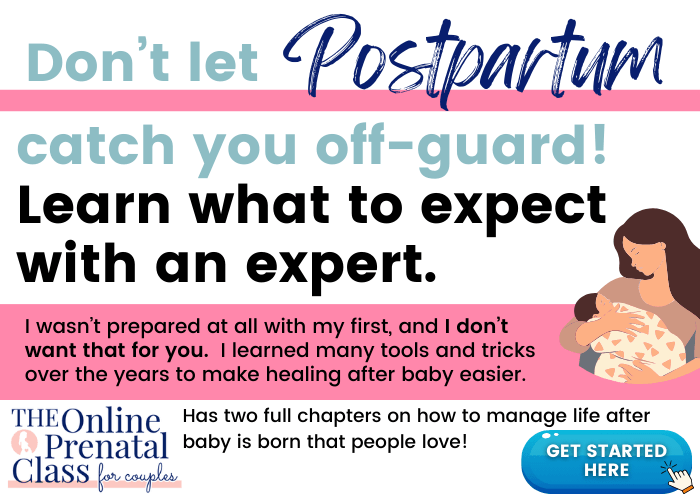
All articles are written/reviewed by pregnancy expert Hilary Erickson, BSN-RN, -- a nurse since 1997 with 20 years of labor and delivery experience. This is medical info, not advice. Consult your provider for expert advice on your own health decisions.

New parents may wonder if childbirth education classes are covered by insurance — and if they are considered part of your prenatal care. In this article we’ll cover the following topics: If they are covered, how to get them covered and if a birth class is really necessary if not a covered benefit.

But first, how do I know so much about birth classes?
Hi — I’m Hilary — The Pregnancy Nurse 👩⚕️. I have been a nurse since 1997 and I have 20 years of OB nursing experience, I am also the curly head behind Pulling Curls and the creator of The Online Prenatal Class for Couples. 🩺 I understand insurance more than the average person after working for a pediatrician, and many large hospitals through my career (plus submitting reimbursement forms for prenatal education for others) so I’m a good one to answer this question for you.
In some cases, yes! Some insurances do cover childbirth classes but it varies by policy to policy, and by what your company has planned to cover.
But, it’s complicated, and sometimes even getting your insurance to cover it (even if it’s an included benefit) can be complicated, so let me give you the steps to try….
Here are the steps you’ll want to try to find out if your insurance will cover your birth class:
Call your insurance company (usually the number is on the back of your card or on the website). You’ll want to have your group and policy number on hand so that they can look up your current coverage (coverage can change frequently, so you’ll want to check with the most current coverage). Ask the customer service representative:
All of those four things are really important to know so you can do it correctly.
Keep in mind that health insurance companies keep up a LOT of red tape in order to stop submission of insurance claims. They plan on you getting so annoyed at the process you just foot the bill yourself. This is especially true for “outsiders” like you (vs a doctor who submits to them consistently).
If that didn’t work, there is one more thing to try:
You can also try your work’s HR. Some businesses offer perks like this separately. So, you do it directly through the benefits department at work rather through insurance. Often this is a cheaper way to have it handled for large companies so they’d rather foot the bill themselves than run it through insurance.
I’ve actually had people who’s HOA covered education for them, so don’t stop with health insurance — you may have other areas that will cover it.
This is where it gets complicated. Your rep may say YES we do cover childbirth classes, but the next question you have to ask is how they are covered.
There are a variety of ways that childbirth education is covered:
Also, they may want to be the one to make payment to the provider (meaning they pay for the class up front), or they want you to pay the provider and then submit for reimbursement.
They may require certain things of the teacher or the company providing the class:
This also really varies by insurance provider.
I will say that any birth class provider should easily be able to offer all of these things (in fact, I have an email already set-up that will just send this out to students who ask, but I don’t put it on my website for safety reasons).
I also have students who ask for this information prior to taking the class and I am happy to provide it. So, you can always check with your chosen class to decide if it’s right for you.
They may also require certain things to be in the class.
So, you want to be really clear on what your insurance requires before you take a class that may or may not be covered (or you find out that they’re not covered, or covered so little it’s not worth your time).

If birth classes are a covered benefit The Online Prenatal Class for Couples should be a covered class (unless you have to take it at a specific hospital). It is taught by a licensed RN, you can provider proof of completion and she has the billing information easily available for you.
But, coverage varies, so be sure to talk with your insurance before you plan on them paying (the good news is that class is well-priced either way.
Usually, these are the numbers you need for medical billing:
Diagnosis code: Z32.2
Procedure code: S9436 (also called a cpt code)
What are those? Diagnosis code Z32.2 is an encounter for childbirth education and Procedure code S9436 is childbirth preparation not provided by a physician (aka, not your doctor just talking to you about in the office).
I am seeing some classes just saying “free” on it and saying it should be free with your insurance, and submit to them — but I think that’s really disingenuous, because most plans don’t cover it. Sadly. BUT I do have some good options for you, so keep reading!
It can always happen that you dot your i’s and cross your t’s and the insurance still refuses to cover it.
I would definitely call and ask them why it was refused. You may have unknowingly made a small error that is easy to fix and you can re-submit. Or, they now have some new rule that no longer makes it covered. That can happen too.

Here is the general answer for some popular health insurance plans (you can skip these by clicking here)
As Medicaid varies state to state, there are some states that cover it (but they differ in how they administer it). This article had some good information on which states cover it, and how they structure it. If you are Medicaid I would definitely call to see if they can help you out. Keep in mind they may offer their own classes which may not fit your needs though. Finding a low-cost birth class that looks good may be a better option for you.
Cigna has a helpful page on what childbirth classes are, but no mention of coverage is given on that page (as it varies by policy and group plans).
Blue Cross Policies and plans vary, especially state to state, so check with your customer service rep as mentioned above. If you google it, you see they do have a reimbursement for in Massachusetts but are clear that your plan has to cover it in order to submit that form.
Aetna’s page on maternity coverage does not mention prenatal classes, but I’d recommend calling and asking about your specific coverage.
As you can tell you really need to call about YOUR specific coverage. If you hate talking on the phone you could always see if your health insurer has a chat option!
In recent years, there have been notable changes in maternity coverage and the ways in which it is included in health insurance plans. Insurance providers have recognized the importance of adequate maternity coverage for expectant mothers, leading to an increase in the number of health plans that include it as a standard benefit.
The affordable care act was huge for maternity coverage. Prior to that act, insurance companies were easily able to exclude maternity coverage as either a pre-existing condition or just as not part of the policy (and some people bought those policies, because they were cheaper — but didn’t know they didn’t include maternity coverage).
Additionally, pregnant women are now more likely to be eligible for coverage regardless of pre-existing conditions, making it easier for them to obtain the care they need throughout their pregnancy. For instance prior to now they may have said a woman’s high blood pressure during pregnancy was a pre-existing condition and they would not cover treatment for it in labor and delivery, but now they have to cover it.
This shift towards improved maternity coverage has been driven by a growing recognition of the long-term benefits that it provides for both mothers and their children. While there is still progress to be made in terms of ensuring that all expectant mothers have access to adequate coverage, the recent changes within the insurance industry are a promising development for women’s health. It is SO important for women to review their health insurance options carefully to ensure that they have the coverage they need during this significant time in their lives.
I can’t stress it enough that when you are considering or have had a baby your needs for health care coverage change a lot and you should look thoroughly at all the options available to you.

No. The affordable care act (also known as Obamacare) did require companies to pay for maternity care, and breast pumps but it did not cover education at all.
But yes, it does require your health insurance to provide you with a breast pump. Some insurance companies only provide you with a specific breast pump (read: cheap), and some allow you to purchase your own and reimburse you up to a certain amount.
Insurance companies are required to include maternity coverage but remember that is only applied as other limits on your policy, meaning:
Many people think that the affordable care act made it “free” to have a baby, but that is very far from the truth. In fact, I think most patients are actually paying more to have a baby now then they were prior to the affordable care act, unfortunately.
Want more information on maternity health coverage I thought this article had a lot of good points people need to think about. This article also specifies what is and what is not covered under the Affordable Care Act (as it currently stands) and how they can and can not apply things to your deductible (aka, birth control has to be free on Obama care plans).
While it can be frustrating, remember that nothing is true “free” — if an insurance covers specific things, they have to raise the price of that insurance to cover those things. Hence, it’s just spread out across the members, not actually “free”.
If you’re unable to come-up with the funds for a birth class you have a few options:
Some charities or private organizations offer grands or scholarships for those who would like to take a class but can’t afford it.
However, personally as an instructor of my own class just email me (you can contact me here). If you really find yourself unable to afford a class I know we will be able to make something work. I believe in birth education and I want to make it accessible to patients of all income levels. You may be shocked at the price tag on my class (it’s the lowest in the businsess), and the payment plans make it VERY affordable.

If you have an HSA or FSA (full names are health savings accounts or a flexible spending account), you may be able to use those funds to pay for the birth class and then submit a receipt for reimbursement. It is always best to check with your provider prior to enrolling in a class to ensure that you will be able to receive reimbursement for the cost. By being proactive and informed, expectant parents can make the best financial choices when it comes to their childbirth education.
Some HSA’s/FSA’s only cover certain portions of a class, so check with yours. This article had some interesting info in it (btw, The Online Prenatal Class for Couples would be covered 100% by HSA’s as the class info falls under those guidelines — we do have some “free” bonuses that fall beyond that– which makes it awesome).
Remember what can be used by an HSA or FSA is actually a government mandate in the US, so check with your CPA is you have questions.
Some business have “cafeteria plans” (also known as flexible benefit plan, flexible fringe benefit options, or Section 125 plans) that help you pay for things like daycare or healthcare in other ways than an HSA or FSA. These often have more specific things that are reimbursable, but check with your employer (or the company they pay to administer it — but your HR should be able to point you in the right place).
Pro tip: A lot of people attempt to use their HSA card (like a debit card for that account) to purchase a prenatal class, but those cards can only be used a pharmacies, or hospitals not any other registers. Most often you just have to submit proof of payment and they will reimburse you.
The cost of childbirth classes varies depending on the location, the instructor, and whether they are in-person or virtual. On average, in-person classes can cost around $200 to $400 whereas online courses can range anywhere from $50 to $500 (depending on what they cover).
I actually did a study on the cost of childbirth classes and found that the average cost of a full childbirth class (that includes information on pregnancy, childbirth and postpartum) in 2022 was $189.
And yes, my birth class starts at under $100. So I really do want to make it affordable. Even my top tier class that offers much more hands-on instruction with many “bells and whistles” comes in at just about the average price at $197.
You’ll find that class fees really vary class to class, and don’t always mean the class is better.
I am able to offer my class at a lower price because I have been doing it so long. I work to keep any fees like class hosting, video hosting and other things at a minimum on my end, and I pass that savings onto you. I also sell a LOT of classes, so it makes keeping the price lower easier.

This one is hard to answer because no, you definitely don’t have to take a class (and the hospital will still support you very well), but studies do show that those who take a birth class have better outcomes.
I want that for you, and I agree with what those studies show in my 20 years of the bedside. Couples who took a birth class were ultimately just happier with their birth and had much less birth trauma because they were educated in advance.